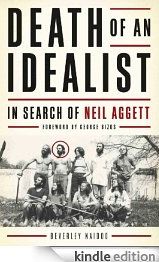Death of an Idealist: In Search of Neil Aggett
 Death of an Idealist: In Search of Neil Aggett
Death of an Idealist: In Search of Neil Aggett
Biography / Adult
London: Green Print / Merlin Press
2014
492 pp.
ISBN: 978-1854251091 (pb)

Beverley Naidoo is best known for her books for children and young adults and is a recipient of the distinguished Carnegie Medal. The current book departs from this pattern in that it is a meticulously researched biography for a general audience about a South African activist, the first white person to die in police custody under apartheid. Although she had never met him, Neil Aggett was Naidoo’s second cousin who grew up in Kenya when his South African parents lived there as settlers until they left in 1964 after Kenya’s independence. Back in South Africa, they staunchly supported the apartheid regime. Aggett’s transformation began when he studied medicine at the University of Cape Town, beginning in 1970. Eventually, he parted ways with his parents and moved to Johannesburg in 1977 where he practiced medicine in black townships and became involved with other anti-apartheid activists in the growing trade union movement. Because of his political activity and his refusal to report for compulsory military service, Aggett was arrested in November 1981 as a communist and traitor along with dozens of others and detained without trial. Seventy days later at the age of 28 and after repeated torture, he was found hanging in his cell. This tragedy led to his parents’ change of heart, but the resulting six-month inquest found “no one to blame” for Aggett’s apparent suicide despite legal representation headed by George Bizos, who famously had defended Nelson Mandela, among others prosecuted by the government.
Naidoo’s family relationship provided her with important access to Aggett’s parents and siblings, who consented to interviews and made available to her their collection of letters and other documents. Naidoo’s own bono fides as a young activist and detainee in the 1960s before her exile from South Africa to England, along with her credentials as a writer and dedication to understanding the “political nuances that had mattered so much” (p. 8) to Aggett’s fellow activists also gained their trust and willingness to share their perspectives and memories—many of which were extremely painful to relive. The resulting biography is one that traces in detail Aggett’s background and the progression of the anti-apartheid movement to which he became so dedicated and for which he ultimately was willing to sacrifice his life. Extensive documentation in sources and notes—some as fascinating as the main text itself—and original photographs provide a sensitive, well-rounded portrayal of Aggett, the rivalries among various movement factions, and comprehensive coverage of the inquest trial. These are further enhanced with a Foreword written by George Bizos, followed by the moving poem “In Detention” written in 1979 by Chris van Wyk (himself an anti-apartheid activist and author who is recently deceased). A key to abbreviations of South African organizations used in the text (which could be confusing without it) is included, and Naidoo’s prologue illuminates the very interesting context for her writing the book beginning with the moment she first heard of Aggett’s death. It was a process that would take her almost two decades to complete and was as she states “more than a single story” (p. 7), only one of which was to learn about her younger cousin.
Naidoo’s second purpose relates to the larger significance of this remarkable biography for all readers. It expands one’s understanding of resistance to apartheid to include the contribution made by white South Africans, who were banned and sacrificed their freedom and, in Aggett’s case at least, his life. As such, it is an important companion work to accounts about the heroic struggle of black South Africans, such as Nelson Mandela’s autobiography Long Walk to Freedom (1995) or Donald Woods’ biography Biko (1991), about his friend and black activist Steve Biko who died in police custody in 1977. Part of the movement’s aftermath was and continues to be dealing with guilt, shame, and blame that survivors have felt regarding their and others’ actions and decisions, such as—under torture or the threat of it—turning over to security forces the names of movement colleagues, staying and continuing the struggle in country or leaving and fighting from exile, and determining which strategies or organizations were most effective. These topics still inspire vigorous debate, examination, and even pain today and have plenty of resonance with ongoing events in the U.S. Naidoo’s search for the truth about the ideals and ambiguities of one example is a masterful addition to the conversation. Highly recommended
Reviewed by: Barbara A. Lehman (The Ohio State University, Mansfield – retired)
Published in Africa Access Review (December 15, 2014)
Copyright 2014 Africa Access
